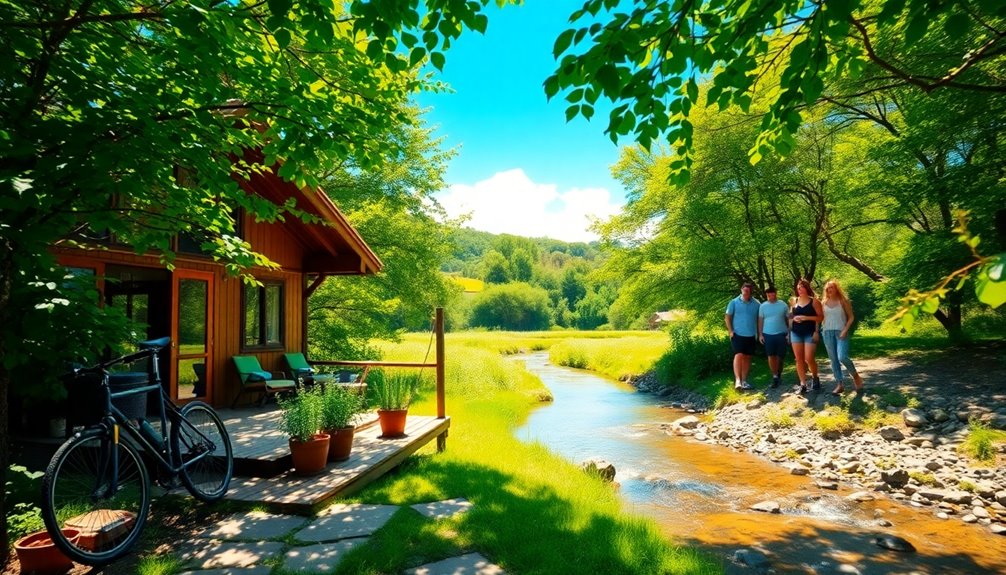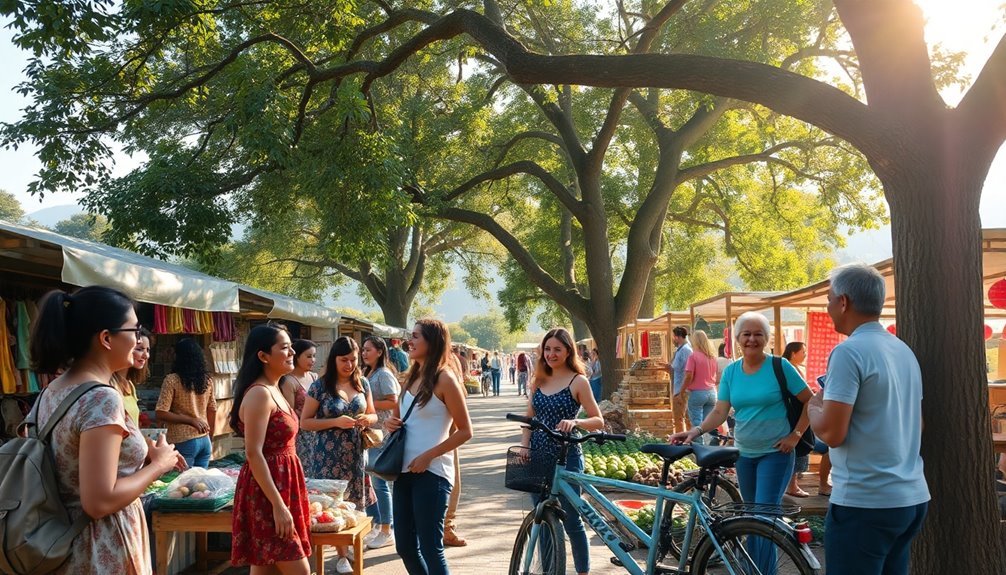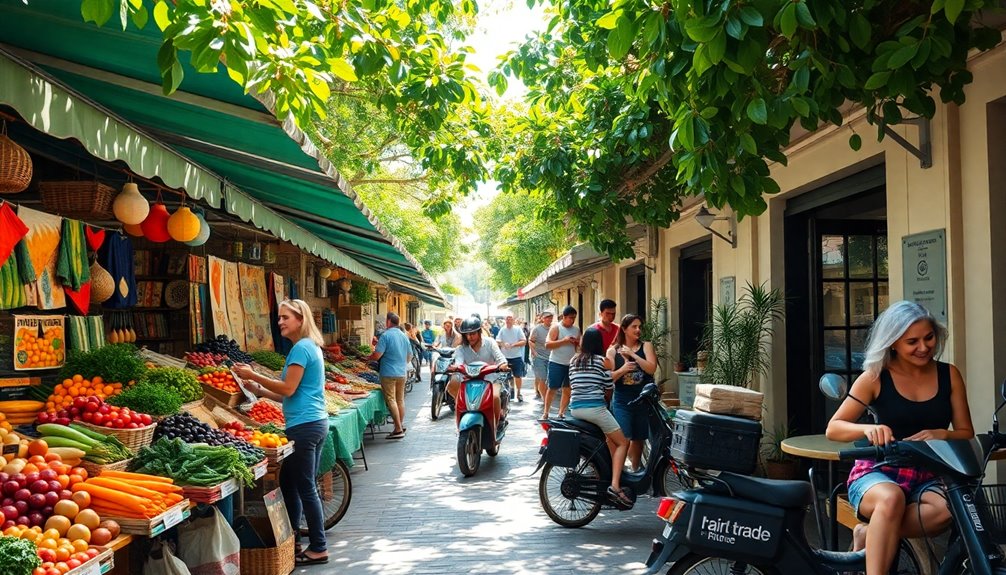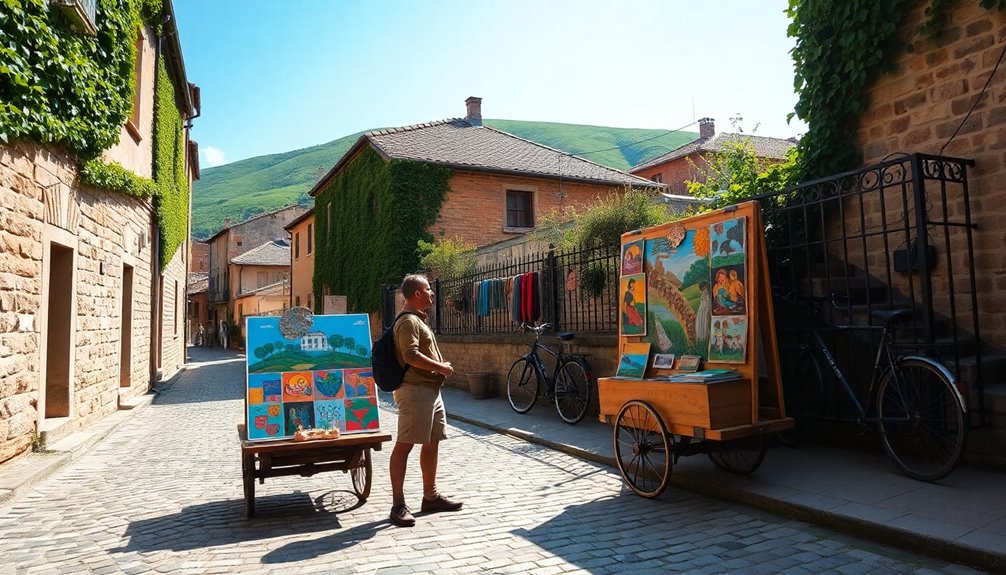The secret to sustainable travel is simple: you can make a real difference. Focus on eco-friendly choices like selecting green accommodations that prioritize renewable energy and waste reduction. Engage with local communities, supporting artisans and vendors to keep your travel dollars circulating. Minimize air travel by choosing trains or buses, and always pack reusable items to cut down on waste. By embracing slow travel, you connect more deeply with cultures while preserving the environment. With these practices, not only will you enjoy your journey, but you'll also contribute positively to the world around you. There's so much more to explore!
Key Takeaways
- Prioritize eco-friendly accommodations with certifications like Green Seal to ensure responsible practices and support sustainable tourism initiatives.
- Engage in slow travel to deeply connect with local cultures while significantly reducing your carbon footprint.
- Pack reusable essentials and minimize disposables to reduce waste and promote environmental sustainability during your travels.
- Support local economies by choosing locally-owned businesses and engaging with community-driven tourism experiences.
- Embrace digital solutions for tickets and guides to eliminate paper waste and enhance your overall travel experience.
Understanding Sustainable Travel

What does sustainable travel really mean? It means engaging in tourism practices that minimize harm to the environment and local communities while enhancing positive outcomes. The purpose is clear: to preserve natural resources and cultural heritage, ensuring tourism remains viable without causing damage.
According to the UNWTO, sustainable tourism considers its economic, social, and environmental impacts, addressing the needs of travelers, the industry, and host communities. Optimal use of environmental resources is essential in ensuring that we balance consumption with regeneration, protecting the ecosystems we enjoy. Additionally, incorporating digital literacy programs can help travelers engage more meaningfully with local cultures.
When you choose sustainable travel, you're contributing to local economies through job creation, infrastructure development, and cultural preservation. It's about respecting local communities and engaging with their traditions while ensuring your travel positively impacts the places you visit.
Ultimately, sustainable travel helps create a better world for both travelers and host communities.
Environmental Sustainability Practices

Sustainable travel practices extend into various aspects of your journey, particularly when it comes to environmental sustainability.
Focus on energy efficiency by using eco-friendly solutions like solar panels and energy-efficient appliances in your accommodations. Select places that hold eco-certification labels and prioritize locally sourced products. In 2023, mass tourism accounted for approximately 8% of global greenhouse gas emissions, highlighting the importance of making eco-conscious choices. Additionally, consider staying in areas that utilize renewable energy technologies to further reduce your impact on the environment.
When moving around, minimize air travel and opt for trains or buses, which greatly reduce your carbon footprint. Participate in local initiatives like beach clean-ups, and always carry reusable items to cut down on single-use plastics.
Lastly, practice responsible waste management by avoiding littering and making conscious choices to leave destinations as pristine as you found them.
Social Impact of Travel

Traveling not only opens doors to new experiences but also has a profound social impact on the communities we visit. By engaging with local cultures and supporting local economies, you can help preserve traditions and create a more equitable distribution of wealth. Your interactions can educate and foster empathy, turning you into an advocate for positive change. Many travelers share a desire to leave places better than they found them, with 71% aiming to make a positive impact. This commitment to sustainability reflects the fact that 71% of travelers want to leave destinations better than found. Additionally, embracing sustainable practices during your travels can lead to good grief experiences that honor the cultural heritage of the places you visit.
Economic Benefits of Sustainable Choices

The impact of your travel choices extends beyond social engagement; they can also significantly boost local economies.
By opting for sustainable tourism, you support local businesses, ensuring that money circulates within the community. This choice not only creates jobs but also fosters community development and preserves cultural heritage. Additionally, the interconnectedness of travel and local realities highlights the importance of a respectful approach to tourism, reinforcing the value of your sustainable choices. Engaging with local cuisines, such as Akara and Mafe, can also provide economic support to food vendors and farmers.
Moreover, when you engage with local artisans and markets, you help maintain unique customs and traditions.
Sustainable tourism encourages a diversified economy, reducing dependence on a single industry and promoting long-term economic resilience.
Waste Reduction Strategies

When you prioritize waste reduction during your trips, you not only lessen your environmental impact but also enhance your overall experience.
Start by packing reusable essentials like a water bottle, utensils, and cloth napkins to cut down on disposables. Choose eco-friendly accommodations that offer refillable toiletries and have recycling programs in place. Additionally, consider staying at places that prioritize sustainable practices to further minimize your footprint. Including hydration support through a reusable water bottle can also encourage you to drink more water while traveling.
Opt for digital tickets and guides to eliminate paper waste, and remember to minimize food waste by ordering only what you can eat and supporting sustainable restaurants.
When exploring, practice Leave No Trace principles by packing out your trash and using biodegradable products.
The Importance of Slow Travel

Embracing waste reduction strategies enhances not only your environmental impact but also the way you experience your travels.
Slow travel significantly reduces your carbon footprint by encouraging eco-friendly transportation methods, like trains and bicycles. You'll notice a drop in energy consumption, as staying longer in one place minimizes frequent travel. This approach also promotes sustainability and environmental mindfulness, creating a positive impact on the destinations you visit. For example, engaging in local camping experiences allows you to connect with nature and immerse yourself in the surroundings.
Plus, you can save money—many accommodations offer better deals for extended stays, and you'll cut transport costs by taking your time.
Engaging with local businesses enriches your trip while supporting sustainable growth. You'll find joy in cultural exchanges and gain valuable insights into local traditions.
Ultimately, slow travel fosters relaxation and mindfulness, allowing you to truly savor each moment and destination.
Responsible Wildlife Interaction

Engaging with wildlife can be one of the most rewarding aspects of travel, but it's crucial to approach these interactions responsibly.
Start by choosing tour operators with clear animal welfare policies that prioritize observing animals in their natural habitats. Avoid harmful activities like touching or feeding wildlife, and steer clear of riding wild animals. Always verify that your chosen operator is affiliated with ethical organizations to ensure their practices align with conservation goals. Additionally, understanding the importance of sustainable practices can enhance your overall wildlife experience.
Stick to observation-only experiences, and be mindful of your surroundings to respect animal boundaries. Support operators that contribute to conservation efforts, and always follow ethical guidelines when taking photos.
Opt for low-impact activities and eco-friendly transportation to reduce your environmental footprint.
Supporting Local Communities

Supporting local communities is vital for creating meaningful travel experiences that benefit both travelers and residents. When you choose locally owned accommodations and activities, you ensure that your spending directly supports families and businesses in the area. For instance, community-based tourism initiatives, like the Ccaccaccollo Women's Weaving Co-op in Peru, provide crucial income and employment opportunities. Additionally, engaging with locals lets you immerse yourself in their culture and traditions, resulting in authentic experiences. Remember to respect local customs and shop at local markets, as this fosters cultural preservation and economic growth. By prioritizing community engagement, you contribute to sustainable development, helping to create a positive impact that lasts long after your visit. Supporting local tour guides enhances the authenticity of your travel experience while further benefiting the community.
Choosing Eco-Friendly Accommodations

Traveling sustainably goes hand in hand with choosing eco-friendly accommodations. Look for places that use renewable energy, like solar or wind power, to minimize your carbon footprint.
Prioritize hotels with water conservation features, such as low-flow showerheads, and those that implement waste minimization practices, including recycling and composting.
Check for eco-certifications like Green Seal or Green Key, which ensure hotels meet strict environmental standards.
Consider unique options like eco-lodges, boutique hotels, or sustainable hostels that emphasize natural materials and energy efficiency. For instance, Fogo Island Inn in Canada is built with local wood and minimal plastic, aligning with the principles of sustainability.
Evaluate the hotel's impact; sustainable practices can save millions of gallons of water and significantly reduce carbon emissions.
The Future of Sustainable Tourism

As the world increasingly grapples with climate change, the future of sustainable tourism is becoming more vital than ever.
You'll find a growing focus on carbon-neutral and even carbon-negative travel, with options expanding across airlines and accommodations.
Ecotourism will let you engage with nature while supporting local communities and conservation efforts. This kind of tourism aims to preserve natural assets while creating economic benefits for local populations.
Wellness and digital detox retreats will cater to your need for mindfulness in a hyperconnected world, promoting mental well-being and sustainable practices.
Additionally, slow travel will help you connect deeply with cultures, reducing your carbon footprint by favoring trains over planes.
With AI-powered recommendations, you'll discover personalized experiences that support both local economies and environmental preservation, ensuring your travels are impactful for generations to come.
Frequently Asked Questions
How Can I Travel Sustainably on a Tight Budget?
To travel sustainably on a tight budget, start by using public transportation like buses or trains, which are cheaper and greener than cabs.
Look for eco-friendly accommodations, such as hostels or eco-lodges.
Pack light to reduce emissions, and always carry reusable items like water bottles.
Eat local to minimize food transportation footprints.
Lastly, plan ahead to find the best deals and explore free activities to save money while being eco-conscious.
What Are the Best Eco-Friendly Travel Apps Available?
Sure! Start your sustainable sojourn with stellar apps!
Try Green Travel Choice for local eco-friendly options, Refill to reduce plastic waste, and Ecosia to plant trees with searches.
Stay informed with Plume Labs for air quality alerts, and savor savings with Too Good To Go, which connects you to discounted meals.
Each app empowers you to explore sustainably while making a positive impact on the planet!
How Do I Find Local Guides Committed to Sustainability?
To find local guides committed to sustainability, start by researching tourism boards and local organizations focused on eco-friendly practices.
Use platforms like Airbnb Experiences or TripAdvisor to discover guides, and read reviews to gauge their sustainability efforts.
Look for sustainability certifications and verify their authenticity.
Engage with locals to get recommendations and learn about community projects.
Finally, assess the guide's impact on the environment and local culture to ensure your choice aligns with sustainable tourism.
What Are the Consequences of Not Practicing Sustainable Travel?
If you think ignoring sustainable travel won't bite you back, think again!
You'll witness pollution, resource depletion, and overcrowding ruining your favorite destinations. Local cultures? They'll fade away, lost to exploitation and social inequality.
And don't forget the ecosystems—you'll watch them crumble under the pressure of your careless footsteps.
Ultimately, you're not just damaging the environment; you're ruining your own travel experience.
Can Sustainable Travel Enhance My Personal Well-Being?
Yes, sustainable travel can definitely enhance your personal well-being.
By engaging in activities like hiking, yoga, and mindful practices, you'll boost your physical health and reduce stress.
Immersing yourself in new cultures increases empathy and promotes mental clarity, while spending time in nature fosters spiritual growth.
Additionally, connecting with like-minded travelers builds a supportive community, which can improve your emotional well-being.
Ultimately, sustainable travel nurtures both your body and mind.
Conclusion
Sustainable travel isn't just a trend; it's a necessity for preserving our planet and enriching our experiences. By making mindful choices—from supporting local communities to reducing waste—you're not just a tourist; you're a steward of the Earth. Isn't it amazing how each small action can lead to a ripple effect of positive change? Embrace the journey of sustainable travel, and watch as your adventures not only enrich your life but also benefit the world around you.










